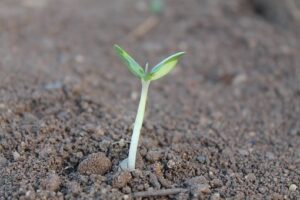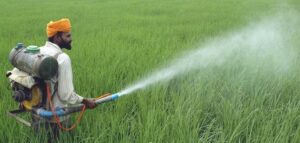Organic farming works : Hello farmers, today we are going to talk about organic farming in India, including types, methods, and advantages. Farmers in India can learn about organic farming through this blog.
The use of harmful pesticides and fertilizers has become more popular in recent years. India faces a major population growth problem. Food needs are increasing as a result of population growth. Using toxic pesticides, chemical fertilizers, and hybrids to produce food. As a result, human health and the environment are adversely affected. To protect ourselves and the environment from deadly chemicals, organic farming is the only option. Organic agriculture is now becoming more popular among Indian farmers.
There is nothing new about organic farming. The goal of organic farming in India is to cultivate crops that will nourish the soil. Do you know how organic farming is done? It uses waste plants, waste crops, animal and farm wastes, aquatic wastes, and other organic materials. The best and most effective way to do organic farming in India will be described in this blog.

How does organic farming work in India?
A method of organic farming in India consists of using organic manure and animal or plant waste to control pests. Pesticides and synthetic fertilizers were causing environmental harm at the time this farming began. Its purpose is to repair, maintain, and improve the ecological balance. Organic farming makes use of organic inputs, such as green manures and cow dung.
The principles of organic farming in India
These principles guide organic agriculture’s growth and development. Organic agriculture can be improved through these methods.
According to organic farming, there are four principles:
The principles of health : the health of the ecosystem, the health of the people, and the health of the communities.
Ecology Principles : ecosystems and the environment or nature must be in balance.
The Fairness Principles : the quality of life and human relationships should be good.
The Care Principles : in addition to the considerations of the present environment, there is also the consideration of the future environment.
There are different types of organic farming
There are two types of organic farming. Find out what type of organic farming India practices below.
1. An organic farm that is pure.
2. Organic farming that is integrated.
An organic farm that is pure: Every unnatural chemical is avoided in pure organic farming. Pure farming uses natural fertilizers and pesticides. Pure organic farming is what it is called. High productivity comes from pure organic farming.
Organic farming that is integrated : Pest management and nutrient management are part of integrated organic farming.
What you need to know about organic farming in India
Organic agriculture covers approximately 2.78 million hectares in India. In India, oilseeds, tea, coffee, dried fruits, millets, cereals, spices, and grains are among the most important organic products. India produces a great deal of these products and exports them. In India, organic products are cultivated primarily in Sikkim, Uttarakhand, and Tripura. Maharashtra, Rajasthan, and Madhya Pradesh are also considered organic farming states.
Farming techniques used in organic farming
Indian organic farming practices some techniques. Below are those techniques.
Management of soil
The management of weeds
The diversity of crops
The use of chemicals in agriculture
Control of biological pests
Management of soil: Organic farming in India relies heavily on soil management. In the course of cultivating soil, nutrients and fertilizer disappear, and the soil loses its fertility. Management of soil is the process of recharging it with all the nutrients it needs. The fertility of the soil is increased through organic farming by using natural methods. Animal waste contains bacteria that can be used in the process. Soil Management is a method for increasing the productivity and fertility of the soil. The bacteria help make the soil more fertile and productive.

The management of weeds : Weed control is the main goal of organic farming. Plants that grow along with crops are known as weeds. Crop production was affected because weeds stuck to soil nutrients.
Two methods can be used to remove the weed.
Cutting or moving : Cutting or moving weeds is part of this process.
A mulching process: Farmers use plastic films or plants to cover soil surfaces in order to prevent weeds from growing.

The diversity of crops : Crop diversity is one of the most famous organic farming techniques in India, as it allows different crops to grow together to meet the growing demand.

The use of chemicals in agriculture : It is important to understand that agricultural farms contain both useful and harmful organisms. Biological growth must be controlled to protect crops and soil. To protect soil and crops, natural methods or fewer chemicals are used. Keeping the area clean is essential to controlling other organisms.

Control of biological pests : Using living organisms as a pest control method may mean using chemicals or not. The organic farming techniques are used by Indian farmers in agriculture.

The advantages of organic farming
-
The crop plantation of organic crops in India is extremely economical, as organic farming does not use expensive fertilizers, pesticides, or HYV seeds. Expenses are not incurred.
-
Farmer returns on investment can be increased by using cheap and local inputs. Indian organic farming has this benefit as one of its most important advantages.
-
Exports of organic products can earn more income in India and worldwide.
-
Compared to chemical- and fertilizer-based products, organic products are more nutritive, tastier, and healthier.
-
A large percentage of Indian agriculture is organic, which doesn’t use fertilizers or chemicals.
The benefits listed above prove that organic farming is profitable for everyone. Organic farming in India needs to be promoted by spreading awareness about its benefits.
The disadvantages of organic farming
-
There are limited off-season crops available for organic farming in India.
-
The main disadvantage of organic farming is the lack of marketing of the products and Inadequate infrastructure.
-
Organic agriculture was in its infancy when there was a limited number of organic products on the market. Farmers face challenges when it comes to mass production.
This is a list of information about Organic Farming in India, including the types of organic agriculture, methods, and advantages. This blog is dedicated to organic farming techniques, so we hope you enjoy it and get the details you need.
To get a more detailed understanding of organic farming in India, organic farming types, and how organic farming is implemented. We will keep you updated with more information.

